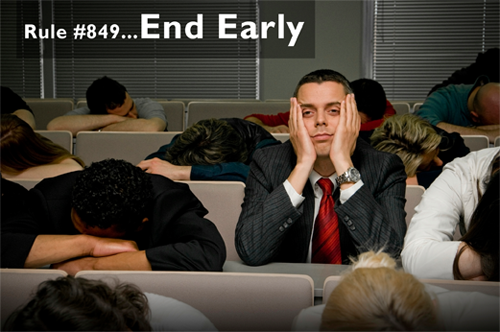End Early
I was in a day long seminar last week. It was quite good in many ways, but one of the biggest things they gave their attendees was that most wonderful gift of all: TIME.
They ended early.
The seminar was scheduled from 9:30-4pm, and we ended a little before 3pm.
In today's overscheduled work environments, everyone wants to be as efficient as possible, but sometimes a bit of planned subterfuge is good for everyone. How often have you found yourself rushing to finish your material at 2:01 as people start streaming out, heading to their next meeting or phone call? (I found myself in this exact situation just last week.) But if you had just an extra 15 minutes of "scheduled" time, there would be no rush at all, no skipping over that last point, time for more questions, and a far more relaxed environment for all.
Psychology of Ending Early
There's another crucial aspect to ending early. It makes you seem more in control of your material and your presentation, and everyone feels as though the collective group has successfully achieved the meeting's goal and received all the necessary information without struggle.
When I was directing theatre, I would always try to end my rehearsals early. You just can't imagine how good it feels as an actor to get out at even 9:45pm instead of 10pm. If I let the cast go at 9:30, I might even get a, "You're a really good director, Nolan..." But just as important as the time itself was the psychological boost it gave people: "We're making so much progress and doing so well, that we can afford to finish early. That was a good rehearsal..." Directors who always go over and keep people late often have demoralized casts who feel beat down and are rarely in a mental place where they can do their best work. (I should point out that I am speaking of early actor-only rehearsals. I don't think any tech rehearsal since Euripides has ended early...)
How to Do It
If you have 60 minutes of material, don't schedule a 1 hour meeting. Make it 90 minutes. Start 5 minutes late (you know you will anyway), add 10 minutes for Q&A throughout and/or at the end, and finish 15 minutes early. Now you'll have time to relax and not rush, to make every point, and make sure every question is answered. And your audience will get the present of 15 more minutes to their day. They won't have to run to their desk to hop on that conference call they scheduled adjacent to your presentation. They can walk, get a cup of coffee, even discuss how brilliant your ideas are with you. You'll be the hero of their morning.
Feel like you're wasting employees' time? Then make it a 75 minute meeting. Or better, take your 60 minutes of material and cut 10 minutes out. If you find you finish and find yourself genuinely with 10 minutes to spare (you won't, but let's imagine), then you can put back in those extra minutes.
Remember, nobody was ever fired for including too much information. But people are fired for not presenting the important information effectively.

